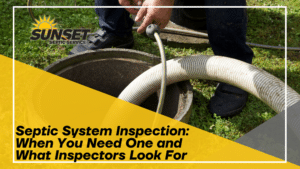Homes in Wisconsin often rely on rural septic systems instead of municipal sewer services. When you’re building a new house or replacing an old system, getting the right setup makes all the difference in how well it works and how it affects the environment around you. Your septic system needs to match your family’s size, work with the soil on your property, and follow Wisconsin’s rules.
Learning about the different kinds of rural septic systems and what makes each one a good or bad fit can save you from headaches and expensive fixes later on.
What Types of Rural Septic Systems are Best for Wisconsin Properties?
The best rural septic systems for your home depends on factors like your land’s layout and soil. Wisconsin homeowners should consider how water drains on their property before making this choice.
- Basic Gravity Systems: These use the land’s natural slope to move waste from your house to the septic tank and drainage area. They work best when your land has deep soil that water can filter through easily.
- Raised Mound Systems: If your property has shallow soil, water close to the surface, or poor drainage, a mound system builds up an area above ground level to safely clean wastewater. Many Wisconsin homes use this type because it works in different conditions.
- Oxygen-Based Treatment Systems: These speed up waste breakdown by adding oxygen. They’re good choices for smaller properties where regular drainage fields won’t fit, but you’ll need to keep up with maintenance more often.
- Plastic Chamber Systems: Instead of using gravel-filled ditches, these systems use connected plastic chambers to filter wastewater. They can be helpful when space is tight, or your soil conditions vary across your property.
What You Should Think About When Choosing Rural Septic Systems
Several important factors determine which system will work best for your rural property:
- Soil Type: Your rural septic systems depend on the soil around it to clean and absorb wastewater. Clay soil holds onto water too much and might need a mound system, while sandy soil lets water pass through too quickly and might need extra treatment steps.
- Property Size & Land Shape: Bigger properties give you more choices for where to put your system, but smaller lots might need compact or alternative designs.
- Protection of Water Sources: Keeping groundwater clean is essential, especially for rural homes with their own wells. Septic systems must be placed carefully to avoid contamination and follow local rules.
Wisconsin Septic Rules & Required Upkeep
To safeguard public health and keep water clean, Wisconsin law requires all private septic systems to be checked at least once every three years. These regular inspections make sure tanks are working correctly and that wastewater gets adequately treated before it returns to the environment.
How often you need to pump your septic tank depends on what kind of system you have, how many people live in your home, and how much water you use daily. Most septic tanks need pumping every two to three years to stop solids from building up and blocking the system.
How to Choose and Maintain Your Septic System
A septic system that’s properly installed and maintained can work reliably for decades. Homeowners can follow these steps to keep their systems working their best:
- Work with a Licensed Professional: A qualified installer makes sure your system meets Wisconsin’s design standards and follows local rules.
- Schedule Regular Inspections: Routine check-ups help catch minor problems before they become expensive repairs.
- Conserve Water: Spreading out laundry loads and fixing leaky faucets reduces pressure on your system and prevents overloading it.
- Use Septic-Safe Products: Harsh chemicals and materials that don’t break down naturally can harm the helpful bacteria your system needs to treat wastewater properly.
Finding the Best Rural Septic Systems for Your Land
Picking rural septic systems goes beyond just getting installed. It’s about how well it will work for years to come, how efficiently it runs, and how it affects the environment around your home. For people living in rural Wisconsin, selecting the right system and taking good care of it helps you avoid expensive problems while ensuring your wastewater gets appropriately treated.
When you need professional septic system inspections, pumping, or maintenance, Sunset Septic offers expert services specially designed for Wisconsin homeowners. Their team can check your property conditions, suggest the most suitable system for your needs, and make sure everything follows state rules.




